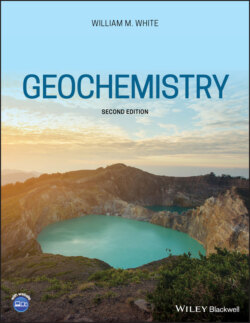Читать книгу Geochemistry - William M. White - Страница 42
2.6 THE SECOND LAW AND ENTROPY 2.6.1 Statement
ОглавлениеImagine a well-insulated box (an isolated system) somewhere in the universe (Figure 2.4). Imagine that within the box are two gases, separated by a removable partition. If we remove the partition, what happens? You know: the two gases mix completely. The process is entirely spontaneous. We have neither added energy to nor taken energy from the system, hence the first law says nothing about this process. Nor did removing the partition “cause” the reaction. This is apparent from the observation that if we reinsert the partition, the gases do not unmix. That you knew that the gases would mix (and knew as well that they would not unmix upon reinserting the partition) suggests there is something very fundamental and universal about this. We need a physical law that describes it. This is the second law.
The second law may be stated in a number of ways:
Figure 2.4 A gas-filled box with a removable partition. When the partition is removed, the gases mix. Entropy increases during this process.
It is impossible to construct a machine that is able to convey heat by a cyclical process from one reservoir at a lower temperature to another at a higher temperature unless work is done by some outside agency (i.e., air conditioning is never free).†
Heat cannot be entirely extracted from a body and turned into work (thus car engines always have cooling systems).
Every system left to itself will, on average, change toward a condition of maximum probability.
Introducing a new state function S called entropy, we may state the second law as:
The entropy of the universe always increases.
In colloquial terms we could say:
You can't shovel manure into the rear end of a horse and expect to get hay out its mouth.
The second law codifies some of our everyday experience. The first law would not prevent us from using a horse to manufacture hay from manure. It only says we cannot get more joules worth of hay out than we put in as manure. We would search in vain for any other physical law that prohibited this event. Yet our experience shows that it will not happen. Indeed, this event is so improbable that we find it comical. Similarly, we know that we can convert gasoline and oxygen to carbon dioxide and water in an internal combustion engine and use the resulting energy to drive a vehicle down the road. But adding CO2 and water to the engine and pushing the car backwards down the street does not produce gasoline and oxygen, although such a result violates no other law of physics. The second law states that there is a natural direction in which reactions will tend to proceed. This direction is inevitably that of higher entropy of the system and its surroundings.
